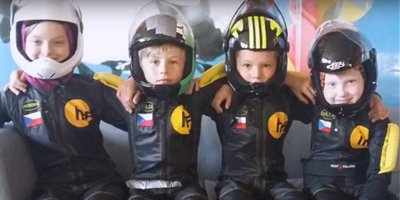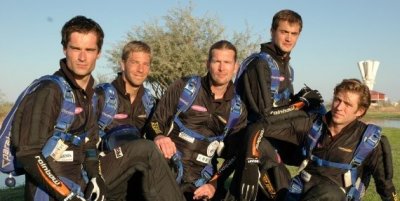
National
Skydiving
League
226 Pecan Street
Deland FL 32724
tel: (386) 801-0804
© 2003 - 2025
All Rights Reserved


226 Pecan Street
Deland FL 32724
tel: (386) 801-0804
© 2003 - 2025
All Rights Reserved


There was some feedback after the publication and it was no surprise, I guess, that my own attention to the family relationships in Formation Skydiving competition teams was on a higher level, too. I will begin with more cases, especially the ones that are coming from a new territory.
I have mostly looked for examples in the adult world, which is logical, of course, as there were no juniors in skydiving at the beginning. I mean as of jumping from planes. There were some crossovers though. Benoit Lemay, member of the Evolution 4-way family from Canada, started jumping and joined the team training as a teenager.
Another Canadian family, the Bissons, had junior Yannick Bisson in freefall while he was training and competing with the 4-way junior team Air Devils, who won the silver medals at the indoor world meet last year.

The new territory is the junior indoor world, and the potential for more 4-way teams with family members is probably even higher there. I know from my own experiences with brothers and sisters that they (want to) play and do sports together. I added the parenthesis to the "want to" since the parents are often directing activities in a certain direction. That does not really make a difference as long as the kids follow the direction and enjoy the activities enough.
It is easy to see that kids who are thrown into wind tunnels by their parents often see their siblings there as well. My, there is absolutely nothing wrong with sharing the experience of flying with the rest of the family, right? Oniy the nature of family bonds alone may create new family indoor teams more naturally than any other efforts.
OK. here come, fresh from the new indoor world, the latest findings: French 4-way junior world champions Eliot Messier and Oscar Massier; Olczyk Flyspot team from Poland with parents and daughters; Matej and Stepan Sotona of the HF Junior Chameleons in the Czech Republic; Hilda, Oda and Arlene Storebo of the VossVind Girls from Norway. Sorry for and to the many that I don't know about - fill me in, please.

OK, let's get to the actual topic. The main question is: Which advantage do the family bonds provide that helps to move the family teams apparently quicker and more often to the top level on the leaderboards?
Family relationships include loads of potential for conflict, whether for or with the parents or between the siblings, or both. The resources are critical, as skydiving and especially team training and competition is everything but easily affordable. Both factors - group dynamics and resources - are crucial for success in Formation Skydiving team competition.
There must be other factors that simply override the difficulties that family teams are naturalIy facing. Could it really be that the most idealistic and beautiful idea comes to full blossoming in our element? Is it really the wonderful experience of sharing the beauty and fascination of the element that is bonding family members even more to each other than normal team mates?

Family members know each other better than anybody else, know all the goodies and the baddies in detail. Teamwork teaches everybody how to deal with different personalities and conflict situations and families can benefit from this maybe even more than other competitors who can just maintain a certain distance from each other if they want to.
![]() Families depend on each other much more than "normal" teammates. Or let's say they are used to depending on each other in their normal living environments. A Formation Skydiving competition team teaches each member more than any other sport how much you depend on each other - both for survivai and athletic performance.
Families depend on each other much more than "normal" teammates. Or let's say they are used to depending on each other in their normal living environments. A Formation Skydiving competition team teaches each member more than any other sport how much you depend on each other - both for survivai and athletic performance.

Families are used to these inter-dependencies; the bigger the family the more experience in this area. Take this and the fascinating and bonding element of flying and get the  answer to the main question? Maybe.
answer to the main question? Maybe.
There is even more, as some other feedback suggested. Family members are aiso used to competing with each other to a certain degree, while they are expecting top performance from their family members.
There is a natural rivalry that can push family members to higher performance levels. Last and not least, parents or older siblings can also be role models. It is not unusual at all that Formation Skydiving competition juniors and seniors have successful, or at least passionate, skydiving parents.
I am ready for more feedback, more examples, and I am sure that this topic will come back...